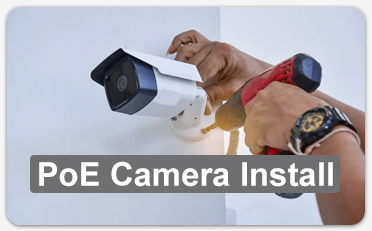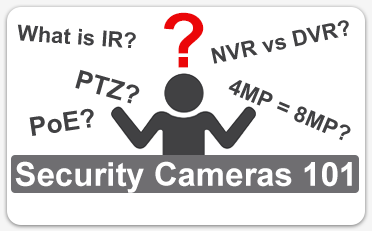Wireless vs. Wired Security Cameras
Wireless vs. Wired Security Cameras: Pros and Cons
When it comes to securing your home or business, one of the fundamental decisions you'll face is whether to opt for wireless or wired security cameras. Both options offer unique advantages and disadvantages, and understanding these differences can help you make an informed decision.
Before we get into the pros and cons, lets talk about the different types of wireless & wired cameras.
Wired cameras come in 2 types; IP cameras otherwise known as PoE cameras and analog cameras. Both of these cameras use wires to transmit the data and/or to transmit power to each camera. IP cameras use a single CAT5e or CAT6 network cable to provide both data and power, via a PoE NVR, PoE Switch, or PoE Injector. Analog cameras use coaxial cables (often times with BNC connectors, and require a separate power supply for each camera.
Wireless cameras also come in 2 types; battery-powered (WiFi or LTE) cameras, or WiFi cameras (that plug into some sort of power). Battery powered cameras usually feature a rechargeable battery (but sometimes can use AA, AAA or other non-rechargeable batteries) that can usually be paired with a solar panel to provide extended or 24/7 battery life. WiFi cameras are wireless in the sense that you do not have to wire them into your network, but still have to plug them into a power source (typically a 110V wall outlet but sometimes a 5V USB port).
Now that we know what wireless and wired cameras are, let's explore the pros and cons of each:
Wireless Security Cameras:
Pros:
-
Easy Installation: Wireless cameras are generally easier to install since they don't require extensive wiring. This makes them ideal for DIY enthusiasts who want to set up their security system without professional assistance.
-
Flexibility: With no wires to limit placement, wireless cameras offer greater flexibility in positioning. They can be placed virtually anywhere within range of the Wi-Fi signal, allowing you to cover more areas effectively.
-
Remote Access: Most wireless cameras are equipped with Wi-Fi connectivity (some can use and 3G/4G LTE SIM card) enabling remote access via smartphones or computers. This means you can view live footage and receive alerts from anywhere with an internet connection, enhancing convenience and peace of mind.
-
Scalability: Wireless systems are often easier to expand or customize, as you can simply add additional cameras to your network without worrying about running new wires.
Cons:
-
Reliability: Wireless cameras depend on a stable Wi-Fi connection, and interference or signal loss can affect their performance. In areas with weak Wi-Fi signals or high interference, reliability may be compromised.
-
Battery Life: Many wireless cameras are powered by batteries, which need to be regularly recharged or replaced. This ongoing maintenance can be inconvenient, especially for outdoor cameras installed in hard-to-reach locations.
-
Potential for Hacking: Wireless systems are susceptible to hacking if not properly secured. It's essential to use strong passwords and encryption protocols to protect your camera feeds from unauthorized access.
Wired Security Cameras:
Pros:
-
Stability: Wired cameras are inherently more stable than their wireless counterparts since they rely on physical connections rather than wireless signals. This ensures consistent performance without the risk of signal interference.
-
Power Source: Wired cameras are typically powered by the same cables used for data transmission, eliminating the need for separate power sources or battery changes. This results in a more reliable and maintenance-free operation.
-
Security: Since wired cameras don't transmit data over the airwaves, they are less susceptible to hacking or signal interception. This provides an additional layer of security for your surveillance system.
Cons:
-
Installation Complexity: Setting up wired cameras requires running cables from each camera to the recording device or monitoring station. This can be time-consuming and may require professional assistance, especially for larger properties.
-
Limited Flexibility: The need for physical cables restricts the placement options for wired cameras. You'll need to plan your camera locations carefully to ensure optimal coverage and accessibility.
-
Potential for Damage: Exposed cables can be vulnerable to damage from weather, pests, or physical tampering. Proper cable management and protection measures are essential to prevent interruptions in surveillance.
In conclusion, the choice between wireless and wired security cameras depends on your specific needs, preferences, and constraints. While wireless cameras offer easy installation and flexibility, wired cameras provide stability and security. Consider factors such as reliability, maintenance, and security concerns when selecting the right option for your home or business security system.
Security Camera Shop offers a wide range of both wired security cameras and wireless security cameras. If you are still not sure what option would work best reach out to our security camera experts today!



